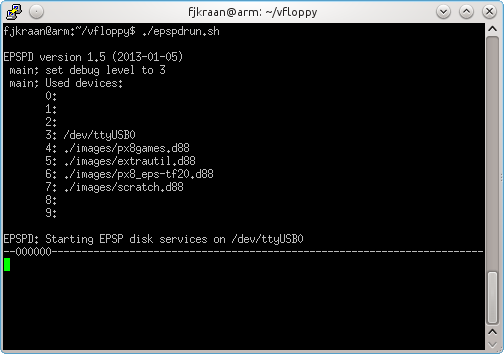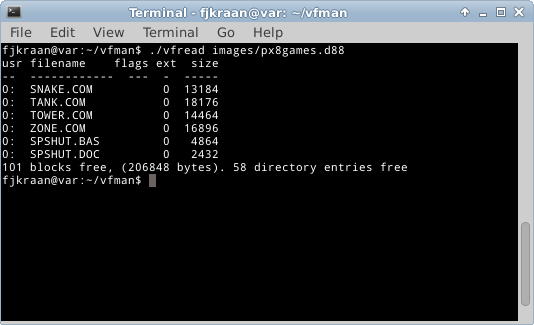Implementation of the Epson epsp-protocol for the PX-4 and PX-8 CP/M laptop computers
Vfloppy is a disk simulator for the Epson PX-4 and PX-8. It uses the epsp protocol used by the Epson TF-15, TF-20, PF-10 and compatible disk stations. It is written in C for Linux, and should be portable to any *nix with standard libraries, including even Windows. Apart from the program, only a serial port and a cable to connect it to the PX-4 or PX-8 is needed.
The original version, written by Justin Mitchell and friends, consisted only of a TF-15 simulator for the PX-4 and a formatter to create empty images. The floppy images were files containing only the sector information of the tracks 4 and up, as the lower tracks are not used by CP/M. This format uses the extension ".vfd".
The versions 1.1 to 1.4 add support for the PX-8, and a read and write utility to transfer files between the images and the file system. Due to a bug, only file sizes below 32 kByte are supported by these utilities. These versions of the utilities use functions which make them less ideal for porting to Windows.
With the advent of the PX4 and PX-8 emulators, a new floppy image format appeared, Pasopia D88. As this format contains the complete floppy (also tracks 0 to 3), the simulator could in principle also support the HX-20 command set.
The 2.0 version of the simulator is an almost complete rewrite based on the Epson protocol description. This was done to make extension of the command set doable. By the way, only the basic commands for reading and writing are supported, the commands for formatting and disk copy are not. Having those too would be nice, but not really needed as these operations can be done on the host computer.
As there appeared to be no read and write utilities for the Epson PX-4/8 D88 format on the host side, I converted the simulator and utilities to this format.
Another advantage of the rewrite is that the source can be made more portable. The 2.0 version of the utilities can be compiled from the same source for both Linux and Windows, and both executables are included.
The simulator isn't available on Windows, due to lack of time and clean, portable code to support the serial port on both platforms.
See for more info the web site http://electrickery.nl/comp/px4/vfloppy/
The vfloppy code was previously located in https://github.com/electrickery/nonSound-vintage.

